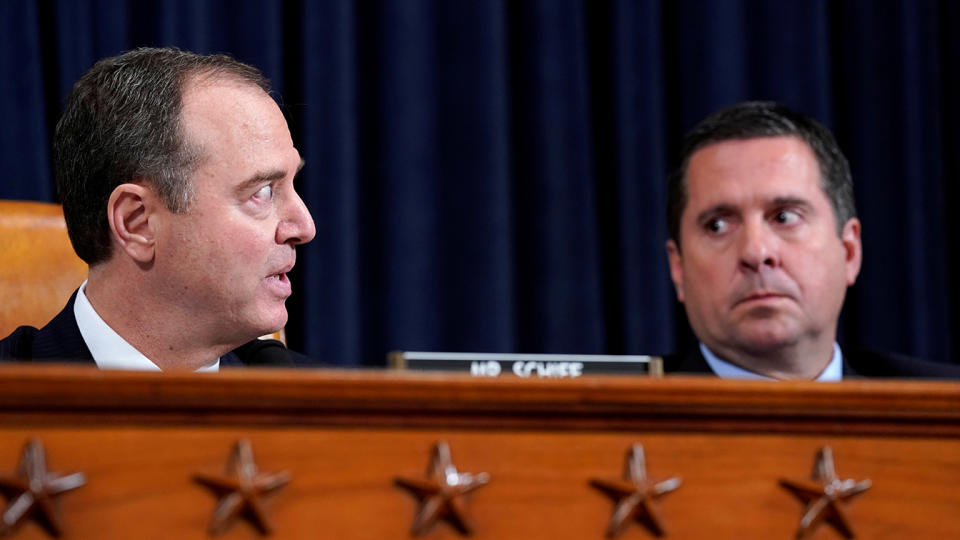Trump impeachment hearing, Day 1: The battle lines are drawn
WASHINGTON — For hours they fought, Democrats and Republicans waging furious battle over what President Trump called his “perfect phone call” with Ukrainian President Volodymyr Zelensky.
During the first day of open impeachment hearings, Democrats repeatedly cast that call — and other actions by Trump and his associates, in particular his personal lawyer Rudy Giuliani — as a blatant instance of corruption. The proceedings, said House Intelligence Committee Chairman Adam Schiff, D-Calif., “will affect not only the future of this presidency, but the future of the presidency itself.”
His counterpart, ranking member Devin Nunes, R-Calif., was just as grave, calling the two witnesses — Bill Taylor, the top U.S. diplomat in Ukraine, and State Department official George Kent — actors in a “low-rent Ukrainian sequel” to the two-year investigation into Russian interference into the 2016 election, or as Nunes called it, the “Russian hoax.”
Taylor and Kent testified for more than five hours, with no respite but a single five-minute break. The impeachment hearing — the first on Capitol Hill since 1998, when Bill Clinton was the subject of an inquiry into his relationship with White House intern Monica Lewinsky — was carried live on television stations and on some social media networks. The halls of the Longworth House Office Building were crowded with journalists, congressional staffers and members of the public, including drag queen Pissi Myles, who won a day that otherwise seemed to have few victors.

That is because, for all the accusation and recrimination surrounding Trump’s conduct, it is unclear how much has changed now that impeachment has entered its public phase. More witnesses will testify later this week, as well as next week, ahead of an expected vote on articles of impeachment sometime before December’s holiday break.
Most of those witnesses have already given closed-door testimony. That testimony, much of which was made public last week, has been widely seen as damaging to Trump, with career diplomats repeatedly asserting they believed the president would not grant Zelensky an Oval Office meeting or, more substantively, release $400 million in aid until the new Ukrainian leader announced investigations into alleged electoral interference by Ukraine in the 2016 election and into Hunter Biden’s seat on the board of Burisma, an energy company with a history of corruption.
The most substantive revelation to emerge from Wednesday’s testimony appeared to be that Trump called Gordon Sondland, U.S. ambassador to the European Union, to ask about “the investigations” into Biden and the 2016 election. That call took place the day after Trump spoke on the phone with Zelensky, seeming to suggest that the U.S.-Ukraine relationship was contingent on an announcement of such investigations being launched. An intelligence official later filed a whistleblower complaint over that phone call, which would eventually lead to the opening of a formal impeachment inquiry.

Sondland’s seeming eagerness to work with Trump was already known. And after Taylor offered the new detail in his opening statement, there was little else that was new in the hours that followed. But this was not because either Taylor or Kent was reticent; to the contrary, they had given meticulous testimony to congressional investigators only days before. There was simply not much more to say, given how forthcoming they had already been.
That’s not to say that the proceedings lacked drama or surprise, despite attempts by White House communications director Stephanie Grisham, the president’s son Eric and others to cast the hearing as “boring.” Daniel Goldman, lead counsel for the committee’s Democrats, questioned the witnesses with a prosecutor’s focus, attempting to fashion from the complex affair a narrative of foreign policy used to achieve political ends.
Goldman’s counterpart on the Republican side, Steve Castor, cross-examined Taylor and Kent but came across as meandering. It fell instead to Trump allies like Nunes and Rep. Jim Jordan, R-Ohio, to offer the kinds of made-for-television moments Trump prefers.
Nunes, Jordan and others — including, somewhat surprisingly, Rep. Elise Stefanik, R-N.Y., who was previously seen by some as not entirely in the pro-Trump camp — criticized the proceedings as rigged by Schiff to yield the expected outcome of a House vote in favor of impeachment. They also suggested that the whistleblower was a partisan operative who had extensive interactions with Schiff before filing his complaint. (Schiff energetically denied this charge.)

Republicans also pointed out that the aid to Ukraine was ultimately released, and that the Trump administration has provided more support — including lethal aid — than President Barack Obama ever did. They also cast Trump's desire to have Zelensky investigate Biden as part of a broader push by both Washington and Kyiv to root out corruption in the Eastern European country.
In the end, Wednesday’s hearing was likely only to harden opinions instead of changing them. Trump’s detractors will continue to see the Ukraine affair as evidence of the ineradicable corruption of his administration. The president’s supporters, meanwhile, are bound to treat impeachment as part of the enduring project to undo the results of the 2016 election.
Perhaps the most insightful moment of the day came from Rep. Mark Meadows, R-N.C., who offered to reporters that “everybody has their interpretation of what truth is.”
_____
Download the Yahoo News app to customize your experience.
Read more from Yahoo News:




